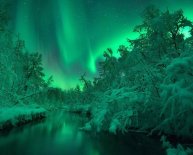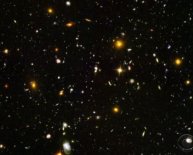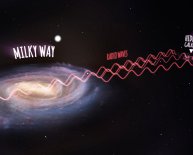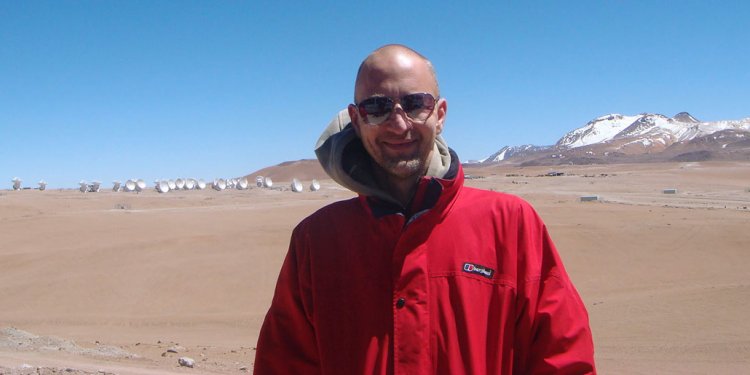
Astronomy News for Kids
Teaching children about the stars helps them learn to love and care for the natural world, says Kenyan astronomer Susan Murabana. And by taking her telescope to remote parts of the country, she hopes to also encourage more girls to get into science.
By teaching people about the stars and Earth’s place in the universe, Susan Murabana hopes to inspire them to take better care of the planet. Photo by Daniel Chu/Travelling Telescope
Susan Murabana always liked science as a child, but it was only after she had studied economics at Nairobi University and met a group of traveling astronomers that she fell in love with the night sky. Now she’s sharing that love through her educational astronomy project, the Travelling Telescope, and is launching a crowdfunding campaign to build East Africa’s first public observatory and planetarium.
Murabana, 37, works with schools in Kenya, training both students and teachers to use computer-based telescopes to observe the night sky and collect data from the surface of the moon using specialized software. She says she is happiest when she is teaching schoolchildren to get hands-on with science and helping them appreciate their place in the world by seeing things through a telescope.
She believes encouraging Kenyans to find wonder in the natural world around them is key to helping future generations look after the planet. And she wants to encourage girls to follow in her footsteps and dedicate their life to science.
Women & Girls Hub spoke to Murbana about her journey to becoming an astronomer, and her plans for bringing the stars and the planets to communities in remote areas.
Women & Girls Hub: How did you start teaching kids astronomy?
Susan Murabana: I fell into it by accident when I finished my first degree in economics. I was invited to teach science in schools with an NGO called Cosmos Education. They showed us how to do simple, hands-on activities to get kids excited about science, including looking at the stars. I saw how they taught and saw how the kids got excited, and I was sold. I wished I had had access to that kind of activity when I was at school. It inspired me to get back into science.
Women & Girls Hub: Where do you take your telescope?
Murabana: At the moment I go to a few schools regularly to run an astronomy club and then I do one-off sessions as well. Some schools are in urban areas and some are really rural. The facilities really vary. In the national schools in Kenya, there is normally better equipment for science; they have some form of laboratories. Some rural schools don’t even have classrooms. If I could I would teach in every school in every location possible. Leaders come from everywhere; I think it’s really powerful to connect children from different backgrounds and help them interact.
Women & Girls Hub: How do you get secondary school children doing research-based astronomy with limited resources?
Murabana: I did some work with schools through a grant from the American organization Hands-On Universe. We used computer-based telescopes to teach students and teachers to look at the night sky in the U.S. and identify constellations. We also used software to process data, measure crater sizes and take down information. And we did teacher training with teachers from Kenya and other countries in Africa. This was also hands-on work using the telescopes and the software in the hope that they would be able to take this knowledge home with them and teach it to their classes.
Women & Girls Hub: Do you see yourself as a role model for girls in Kenya who might be inspired to get into science?
Murabana: I hope I inspire young girls! It is important to get leaders in science to reach out to girls to show them it is possible to achieve whatever they want to do. I was lucky to have supportive parents and I have realized it is important to talk to parents, too, to help them be supportive of the things girls want to do. Sometimes boys are more supported with this kind of thing, so it’s important girls also feel they can achieve something.
Women & Girls Hub: What’s the most exciting experience you have had looking up into the sky?
Murabana: In 2013, Kenya experienced a total solar eclipse. We knew it would pass through Marsabit and Turkana, which are really impoverished areas in Kenya. My international astronomy friends helped me organize a trip to witness the eclipse, and on the way we stopped at schools to distribute solar glasses and explain to them what was happening.
When we reached Turkana, we went to a school there. With us on the trip was an 80-year-old member of the Rotary Club of Nairobi who had with him photographs of a previous eclipse he had witnessed. Watching him getting excited explaining the eclipse to schoolchildren in this very rural area will always be a special moment for me.
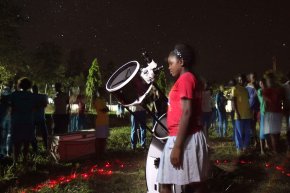
Women & Girls Hub: Tell us about your plan to build a planetarium.
Murabana: We want to crowdfund to build a public observatory in Kenya where we can invite schools and families to come and understand more about the planets. We want it to be educational and entertainment at the same time. We also want to raise funds to build a state-of-the-art planetarium. We have a mobile planetarium that we use now to do demonstrations and we have realized it is a really good way to get people excited and inspired by the sky. I think if we can get children to be excited about the stars then it will change the way they look at life.
We hope it will also create jobs for science graduates in Kenya and attract people from all over Africa. People don’t realize how applicable astronomy is to other parts of life. They think you stare at the stars and that’s it. But it benefits a young generation to think differently about the universe and their place in the solar system. It leads to all sorts of realizations that will help us learn to protect the world around us.
We also want to develop applications to encourage visitors to understand other hands-on ways they can use science in their own environment, like using solar energy or growing environmentally friendly food using aquaponics [a method of growing fish and plants together in one integrated system].
Women & Girls Hub: Who has been your biggest inspiration?
Murabana: The first African woman to win a Nobel peace prize was a Kenyan. I have always really been inspired by Wangari Maathai, even before she was famous for winning the Nobel prize. I remember her fighting to save the forests in Nairobi. She said, “If we don’t take care of the natural environment then Africa will be the first place to suffer.” She was right, that is what is happening now. Today, everyone knows about her and what she fought for and that is something we can do with astronomy. We can use it to make people aware of the situation they are in.
institute for education blogging salary presidential education award savannah guthrie education blog underneath their robes blogging questions blog like tiny buddha blog meaning in english blog vs vlog rand paul education continuous education environmental education education to the core blogging in education education secretary orange county department of education boaters education over blogging definition institute of education sciences masters degree in education pro blogging tips blogging on shopify blog questions for students brown vs. board of education education companies which of the following is a goal of hunter education blogging in spanish blog layout blog post us department of education login special education schools blogging startup blogging the boys
